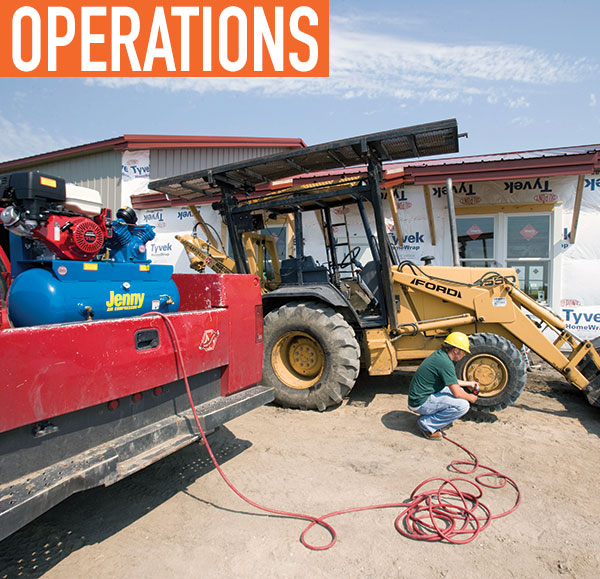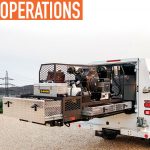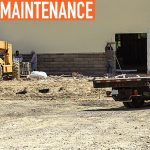Selecting an air compressor for your service truck—how tough could it be? If you don’t use it much, just go with a cheap, off-the-shelf unit. Or, if you use it a lot, the bigger the better, right?
Actually, to get a solution that will best serve your needs, you should put more thought into it. From air pressure to horsepower, an operator must identify the proper balance of features to meet his needs. It’s the only way to ensure enough air performance to get the job done effectively and reliably. Here’s a breakdown of some of the key factors to help make the decision process a little easier:
CFM REQUIRED
When it comes to a service truck compressor, the number one factor in choosing the best solution is capacity. If a compressor can’t handle the load required to power the end-user’s most commonly used air tools, then it’s going to produce little more than major frustration.
Begin by adding the CFM (cubic feet per minute) requirements for all the tools to be used simultaneously, such as impact wrenches, high torque ratchets, blow guns, etc. Add another 30% to allow for unknown or uncommon compressor usage. The CFM rating is found either on the tool itself or in the owner’s manual. It can be figured three ways:
Displaced CFM (DCFM) is simply a mathematical calculation of the bore, stroke, and rpm. But it does not take into account any of the important variables, such as temperature, atmospheric pressure, humidity, friction, or heat dissipation, and therefore it means almost nothing in the real world.
Standard CFM (SCFM) is a better measure of reality. SCFM is the flow of free air in a standardized environment—such as 14.5 psi atmospheric pressure (the pressure at sea level), 68 degrees F and 0% humidity.
But what about individual needs? For example, if someone is working in mile-high Denver in January, it surely isn’t going to be 68 degrees. Or, a person could be in Louisiana in July when the humidity is off the charts.
Actual CFM (ACFM) figures in the variables that apply to each situation. It will provide output of the pump for the actual working conditions. But ACFM is a hard figure to get, precisely because it requires site-specific data and calculations that may be best left to an engineer.
For selection purposes, the best bet is to compare compressors based on the SCFM ratings. This puts all units on a level playing field for a true apples-to-apples comparison.
OPERATING PRESSURE
CFM is also important to know when considering a single-stage compressor versus a two-stage model. Begin by listing the minimum operating pressure requirements for the tools to be used, which will indicate whether a single-stage or a two-stage compressor is needed. Single-stage compressors are fine up to 150 psi. Anything more will require a two-stage.
A single-stage compressor will typically have a higher CFM rating because the cylinder is drawing in air and compressing it with every rotation, whereas a two-stage is compressing the air up to an intermediate pressure in one or more cylinders and then passing it on to another cylinder to finish the job. Because the air is typically passed through an intercooler between stages, a two-stage compressor is more efficient at higher pressures.
RECEIVER TANK
Once again, the capacity of the compressor tank, which is usually measured in gallons, depends on how the compressor is used. If running tools that require quick, concentrated bursts, such as impact wrenches, a small tank is best. If the tools are to be used for sustained periods, such as for inflating tires, a larger tank will work better.
But bigger doesn’t necessarily mean better. With more size and capacity comes additional cost. There’s no need to spend more for a compressor than what caters to an operator’s typical workload. A larger compressor simply means it can handle a greater workload, but it won’t increase the performance of the tool. As long as one selects a unit that can support common needs, then they are paying for just the right amount of air.
QUALITY
In today’s ability to buy just about anything at a local big box store, it’s important to keep quality in mind. What can be bought over-the-counter may work perfectly for a weekend warrior, but they aren’t ideal for professionals who rely on their compressor to perform day in and day out.
Before making a selection for your service vehicle, analyze the overall construction of the compressor. Are the components made from heavy-duty metal, or are there plastic shields and guards? Are the grease fittings located in protected areas so they aren’t easily damaged? And, if the compressor is belt-driven, is the belt fully enclosed by a heavy-duty guard? These questions are answered simply by looking at the compressor, but other features aren’t as visible. For instance, one should ask about the construction of the pump’s cylinders. Cast-iron cylinders and linings are regarded as the most durable, while aluminum alternatives are subject to much more wear and tear.
Also, since all compressors require ongoing service to operate at full potential, its serviceability can add great value. Some manufacturers design their products with wear parts that are easily replaced. As long as routine maintenance is performed, these units are likely to withstand thousands of hours of use. If they actually break down, the compressors can usually be fixed on-site or taken to certified dealers for repair. Other products on the market are better suited for noncommercial use and are practically disposable. Once something goes wrong, there are often no servicing dealers or replacement parts available to remedy the problem.
Overall, the most critical issue to keep in mind when selecting a compressor is job analysis. To select the right compressor for your operation, it’s best to understand the requirements of your current and future projects. Start by creating a realistic checklist using the factors outlined above. From there, it will be much easier to find a unit that meets your needs for years to come.
ABOUT THE AUTHOR:
Dan Leiss is the vice president of Jenny Products, Inc, a manufacturer of air compressors, pressure washers, and steam cleaners based in Somerset, Pennsylvania. Dan has more than 26 years’ experience developing and marketing stationary and portable air compressor solutions. Find out more, visit www.jennyproductsinc.com.
MODERN WORKTRUCK SOLUTIONS: JULY 2018 ISSUE
Did you enjoy this article?
Subscribe to the FREE Digital Edition of Modern WorkTruck Solutions magazine.
![]()




